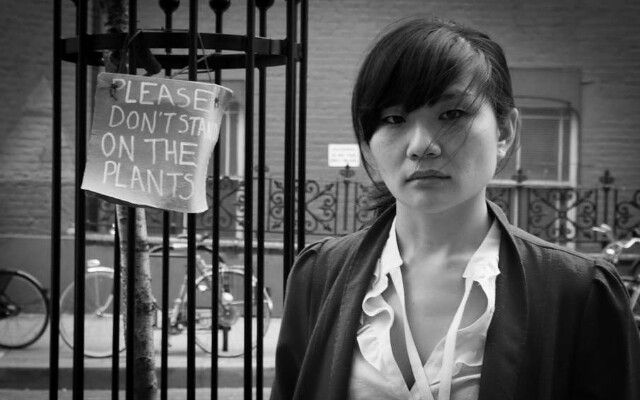Live at Cafe OTO // Okkyung Lee & Mark Fell

Photo by Nathan Thomas / Fluid Radio
Café Oto’s most recent residency brought Korean cellist Okkyung Lee to the Dalston venue for four days of solo and collaborative performances. I caught day two of the residency, where Lee, a prolific collaborator, played with Sheffield based multidisciplinary artist, Mark Fell. The two are an interesting pairing, being sonically very different yet clearly taking similar, often improvisational approaches and drawing on comparable influences, be these ambient, noise, jazz or avant-garde.
The evening begun with a solo performance from Okkyung Lee. Lee played in the middle of the candlelit room, inviting audience members to sit on the floor around her. This was an intensely physical performance, aided by the intimate, stage-less venue. Lee’s playing jumped around from being frenetic and time signature free, to sections that were more akin to a drum roll than traditional cello. The relentless twenty minute performance, in which her bow was blur almost throughout, continually defied my expectations of how cello can be played. Particularly impressive was just how percussive the instrument became under Lee’s control.
The collaborative performance with Mark Fell, who sat across the room, facing Okkyung Lee, comprised of three pieces, broken up by a long interval after the first. In this first performance Fell emitted almost only drums, which were minimal in tone but fluid in timing, reminiscent of the drums on his collaborative album from this year with Gábor Lázár. Sonically, the two musicians produced almost opposed sounds; Fell’s clinical, clean drums contrasted the raw, predominantly unprocessed sound of Lee’s cello playing. Moreover, there was a conflict between the physicality of the two performers, Lee playing violently and expressively, and Fell sat still, occasionally padding at the touchpad of his laptop. This worked incredibly well, producing a tension and atmosphere I’d not previously experienced.
The second collaborative piece was almost drumless, though, thanks to Okkyung Lee, still highly percussive. Mark Fell replaced drums in this piece with a synthesised drone, which slowly became more rhythmic over around 20 minutes. Lee overlaid this with screeching cello, making audible the rough texture of the coiled strings, and at times utilising the taut strings below the bridge. Fell’s sounds were less clinical this time around, and at times became distorted and twitching. As a result, there were moments of sonic unity in this piece, where the sounds of the two performers were hard to distinguish. This was a stark contrast to the conflicting sounds of the first collaborative piece. The final piece was the only one to have a distinct tempo. Original sounds from Fell were largely absent here, instead he subtly processed Lee’s playing with loops and delays. This was the least frenzied piece, both musicians playing with more restrained than in the preceding pieces.
Given the sonic disparity of the two musicians, they delivered a surprisingly cohesive performance, at times tense and conflicted, yet at others, complementary and harmonious. Lee summed the evening up well, standing up at the end the performance, cheerfully announcing to the 50 or so audience members: “that was fun.”
- Published
- Nov 5, 2015
- Credits
- Words by Harry Murdoch
